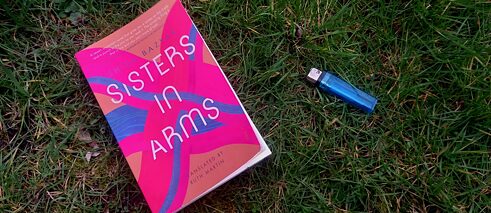March 2024
Sisters in Arms: A Summer of Reckoning

If you didn’t want Zadie Smith’s novel NW to end, why not add Shida Bazyar’s Sisters in Arms to your TBR pile?
Zadie Smith’s NW is a book that will always put me in mind of a heat-ridden summer’s day opening as it does with Leah tripping ‘sun-huddled’ out of a hammock and finishing with children ‘spinning on the lawn’, while Leah and Natalie call the police. The novel is full of a tension that belies this drowsy heat, and is wildly expansive, tracking back and forth between these charged summer days and the women’s coming of age in an exploration of friendship, class and our attempts to escape the origins that shape us.
Like NW, Shida Bazyar’s novel Sisters in Arms, deftly translated by Ruth Martin, flits between a tense sun-drenched present and various flashbacks – defiantly non-chronological – from the lives of the main characters, three friends who grew up in ‘a grubby corner of some provincial town’. The novel starts with a newspaper article: a house has burnt down and a number of people have died in a case of suspected arson. A young woman, Saya M., has been taken into custody. The newspaper doesn’t shy away from painting her as a radical Islamist.
The book itself is narrated by Kasih, Saya’s friend, with whom she shares ‘at least one childhood, at least half a lifetime, at least two categories of discrimination’. Waiting up through the night for Saya to be released, Kasih is angrily and insistently writing her own account of events. Saya had been visiting Berlin, where Kasih and their friend Hani now live, and the women ought to have been settling into their regular friendship: they take beers up onto the rooftop of Kasih’s block of flats, Saya falls once again into the role of storyteller, and Hani as usual voices apprehension as her friends unite in indignation against the micro-aggressions they repeatedly encounter.
The novel is fuelled by Saya and Kasih’s fury at the racism others are happy to discount as normal, but this friendship – by turns warm, weary and witty – is the book’s heart. On this visit though, the friends’ usual scripts are thrown off-kilter by the trial of a neo-Nazi group guilty of multiple murders, and Saya – always the most politically vocal of the three – finds herself obsessively reading screeds of online hate speech by trolls and fascists.
Bazyar has an incredible eye for observation, and more than once when I’m reading I have to reach for my phone, sharing an extract with a friend with a jolt of recognition. She’s also not afraid of wrongfooting the reader: Kasih more than once finishes an anecdote with the words ‘I will admit, I just made that bit up’, so that our understanding of the narrative is never quite stable. Kasih also has a clear sense of who might be reading her report – and she doesn’t think much of them:
‘No, sure, you’re not like that, and that isn’t how you think at all… You were nice racists. And doing all that aid work, you saw that these refugees are always good for a surprise… and now every time you have dinner with friends you can tell them all the things you’ve learned.’
All of this could make for a heavy read, but it never is, perhaps because of the warmth of the women’s friendship, or Kasih’s wry eye for detail, or the urgency with which the narrative sweeps the reader up. Sisters in Arms is a gripping and immersive novel which will linger in your mind long after you finish it.
About the author
Annie Rutherford makes things with words and champions translated literature in all its guises. A writer, translator and events organiser, she's currently researching the possibility of setting up a Writers in Exile residency in Edinburgh, and also runs Lighthouse Bookshop's Women in Translation book group. She can spot a misplaced apostrophe at a distance of fifty yards.Find out more about the blog.
Book Blog Overview